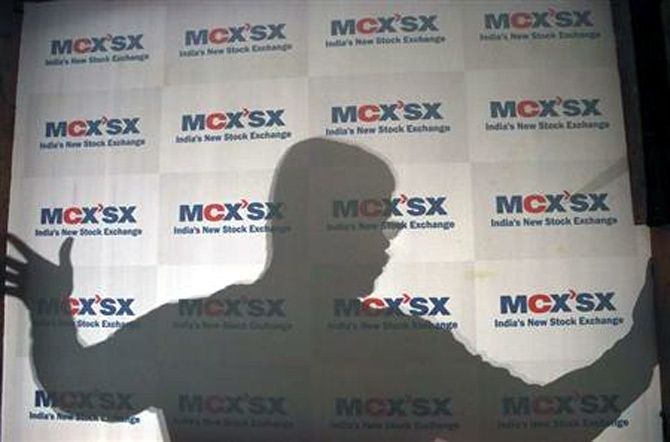 Venkat R Chary (74), a senior former bureaucrat and the non-executive chairman of Multi Commodity Exchange (MCX) for a decade until August 2013, is now an independent director at Financial Technologies India Ltd (FTIL) since October 2013.
Venkat R Chary (74), a senior former bureaucrat and the non-executive chairman of Multi Commodity Exchange (MCX) for a decade until August 2013, is now an independent director at Financial Technologies India Ltd (FTIL) since October 2013.
He tells Rajesh Bhayani in an interview, in his personal capacity, that he will ask the Central Bureau of Investigation (CBI) why his name has been dragged in relation with the payment crisis at National Spot Exchange Ltd (NSEL).
Chary also says some government officials have played an important role in favouring organisations that MCX competes with. Edited excerpts.
Your name is being discussed at public forums over the role you might have played in the NSEL crisis...
I have had no connection whatsoever with NSEL, which, I believe, fell prey to fraud by employees. The police and the courts are looking into the matter and the law will take its own course. However, I must say there are certain vested interests that have been consistently defeated in market competition by MCX, IEX, etc. They are out to destroy young entrepreneurs. That is a sad thing.
How would you back your point about competitive forces behind all this?
I don't make casual statements. I know for a fact that a senior official in the finance ministry had recommended on government files in December 2007 that NCDEX (a competing private commodity exchange) needed to fight with MCX and that its original lead promoter ICICI Bank had exited from NCDEX.
He had written that LIC and Nabard (both public-sector entities) held 15 per cent each in NCDEX and should be asked to dilute their stake to the extent of five-six per cent.
This was in favour of the National Stock Exchange (NSE)... to allow it to hold a much higher stake. This, the official said, would help NSE steer NCDEX to compete better with MCX. His noting was endorsed by the then secretary (financial services), finance secretary and the finance minister.
Who wrote this noting?
The joint secretary (capital markets division), wrote this in 2007. Can you believe that a senior government official could propose that public-sector companies be asked to sell their stake in a private company (NCDEX) to strengthen another private company (NSE) so that it can help NCDEX fight yet another private company, MCX?
Didn't you take up this with the relevant authorities at that time?
I wrote a letter of complaint to the Central Vigilance Commission for necessary action. They replied that my complaint had been registered and that I could check its progress on their website. But the website did not show any information at all! So, I don't even know if that complaint was actually registered. I also wrote to CBI's anti-corruption bureau, PMO, the finance ministry, the Union department of personnel and other related organisations, including the consumer affairs ministry, which was regulating MCX then. But all of this was to no avail.
The speculation is that you may have played a role in influencing bureaucrats and getting favours for NSEL or, for that matter, MCX-SX?
Let me tell you clearly, I will not tolerate if anyone tries to drag me into something I am not at all connected with.
That's the NSEL case. As I said, the spot exchange fell prey to fraud by employees. I have never taken up their case with anybody. I was heading MCX as non-executive chairman and had absolutely no connection with NSEL. But if you are talking about CBI, I will go to them and ask what they have done with the complaint I filed with them against the ministry official. I will also ask them why my name has been dragged in the NSEL episode.
What went wrong with Sebi, which first gave licence to MCX-SX and then things changed?
I remember, when currency derivatives were being permitted, I had suggested to the Reserve Bank governor in writing that a joint committee of RBI and Sebi be expanded to include the Forward Markets Commission and to allow commodity exchanges to also launch currency derivatives. However, their decision was to allow only stock exchanges.
That is why MCX and FTIL had to form a new company for stock exchange, with a net worth of not less than Rs 100 crore. I recall C B Bhave, the then Sebi chairman, telling us: "Remember, you are recognised as a stock exchange. Do not deny to yourselves the right to be in all other segments that a stock exchange can be in." Later, many things happened and the market perception in those days was that some competitive forces might have influenced Sebi to change its stand.





.jpg)






 © 2025
© 2025